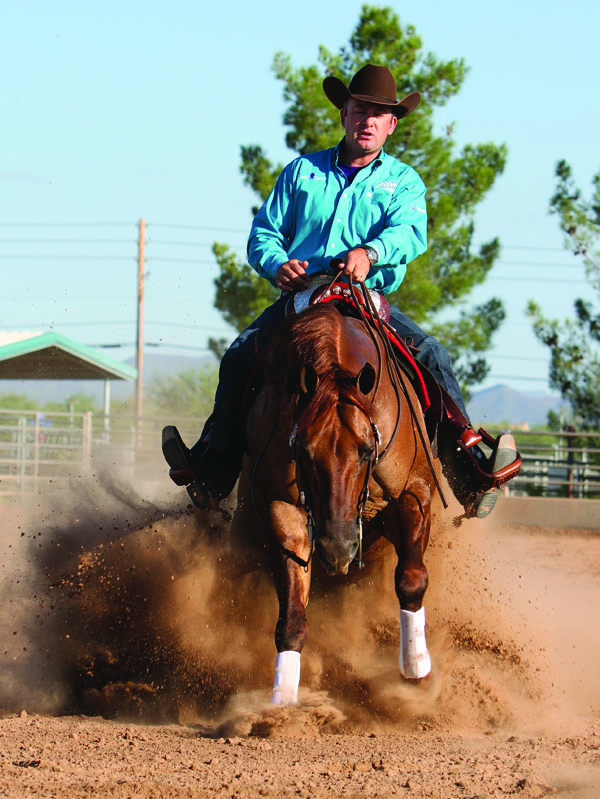A few weeks ago, I perused my Instagram Stories and caught one with my friend Sheley Brien. Sheley is a lifelong horsewoman, successful reiner, and a performance and health coach. Her story focused on your body not knowing what you perceive to be your limitations—not having a runner’s body, for example but running anyway because your body doesn’t know it’s not meant for running unless your mind tells on you.

I got to thinking: This is so true for many of us in our horse lives. I reached out to Sheley to see if she could reinterpret her advice for riders of any level or discipline, and she was excited to share that it’s something she sees all the time, too.
“The whole thing is that your body reacts to what your mind tells it,” she said. “Think about a blissful morning. You had a great night’s sleep, your coffee is perfect, and your horses were happy to see you when you went to feed—your body reacts to that in a positive way because your mind is in a positive state. In contrast, if you’re in a scared, anxious, or nervous state, your body feels that and reacts in response. You might physically feel tight, apprehensive, and unconfident.”
Sheley’s example perfectly demonstrates that your body responds to what your mind communicates. Now let’s dive deeper into in-the-saddle experiences that might cause you to limit yourself and how to get past it.
Read More: 4 Mindset Keys to Achieve Your Goals
Living in the Past
Think about a time you showed, ran a pattern, or even traversed a trail when it didn’t go well. Maybe you missed a lead change, hit a barrel, or had a scare. How did it cause you to set limits for yourself?
“If you get in the saddle the next time and only focus on the past, your body will follow those thoughts,” Sheley shared. “You’ll feel regret, anger, sadness, letdown, fear—all things that cause you to limit your experience. My personal example comes from rundowns in a reining pattern. I had a horse that was literally a runoff—when we turned the corner to run to a stop, I just knew he was going to take off because he had in the past.
“This feeling bled into future horses I showed. Every time a rundown came up, I’d tighten my body in expectation that it wasn’t going to go well. My mind told my body to brace for speed, and I’d get tense, tight, and short of breath. I had to forgive myself and my horse for that mistake so I could gain a sense of confidence and control. I had to recognize that, in the warm-up pen, we could rundown correctly without incident. I had to focus on that confidence and those feelings of security, safety, and strength that I had outside the show pen. Once I could do that, it made all the difference when it mattered in the arena.”
Past emotions can drive what your body does, but you’re in control of how you position those emotions and thoughts. If you dwell in the past and use those experiences and emotions to create excuses, you can’t overcome them and face the reality that you actually can do the thing your mind might say you can’t.
Common Limiting Talk
“Your body follows what your mind tells it,” Sheley explained. “You must be aware of the self-limiting thoughts and negative talk you engage in, whether it’s with yourself, your peers, or your trainer.”
Common self-limiting talk/thoughts Sheley hears from riders:
- I’m too old.
- I’m not a good enough rider to do that.
- I don’t have the time.
- My injury is holding me back.
- I’m scared I’ll ruin my nice horse.
When you engage in this kind of self-talk, your body says, “Yep! You’re right—you have no timing, so you won’t be successful in the show pen; that old knee injury won’t allow you to ride that far down the trail; you can’t run a faster barrel pattern because you’re too old.”
Read More: Mind Control for Show Nerves
“Even though these thoughts are negative, they’re comfortable,” Sheley said. “We always want to go to what’s comfortable because it’s easier! But are these statements true? Are you really a bad rider? No. Is it true that you can’t ride well because you’re old? Heck no—there are lots of great riders late in life. Force yourself to reflect. Find the trigger, then train yourself to replace that limiting thought with a positive one.”
Overcome Limiting Thoughts
The first step to overcoming anything is to recognize it, and this is true with negative self-talk, too. But it’s probably the most difficult part of the process.
“Put yourself in an uncomfortable situation,” Sheley advises. “It could be backing poles in the ranch riding, lead changes or a rundown in reining, or a steep incline on a trail. Once you’re there, ask yourself what triggers your doubts. Is it a past thought or experience? Is that story true—can it be validated? If it’s yes, then work on it. If it’s untrue, change your self-talk and your mindset.”
Sheley Brien is an Arizona native, a horsewoman, a wife, and mother of two. She’s also a businesswoman, multipreneur, and health and performance coach. She is an avid reining competitor, earning 2020 NRHA Top 20 Non-Pro. Sheley’s love for horses led her to found ReinerStop in 2012, which evolved into a digital media and education resource that uses reining to connect horse enthusiasts to the equine community. Sheley’s performance and health coaching business, FourZeroFit, showcases her knowledge and experience in coaching professional women and moms how to regain their confidence while building their dream body without sacrificing their busy schedules.



![IMG_2415[8]](https://s3.amazonaws.com/wp-s3-horseandrider.com/wp-content/uploads/2022/08/29101749/IMG_24158-768x512.jpg)


